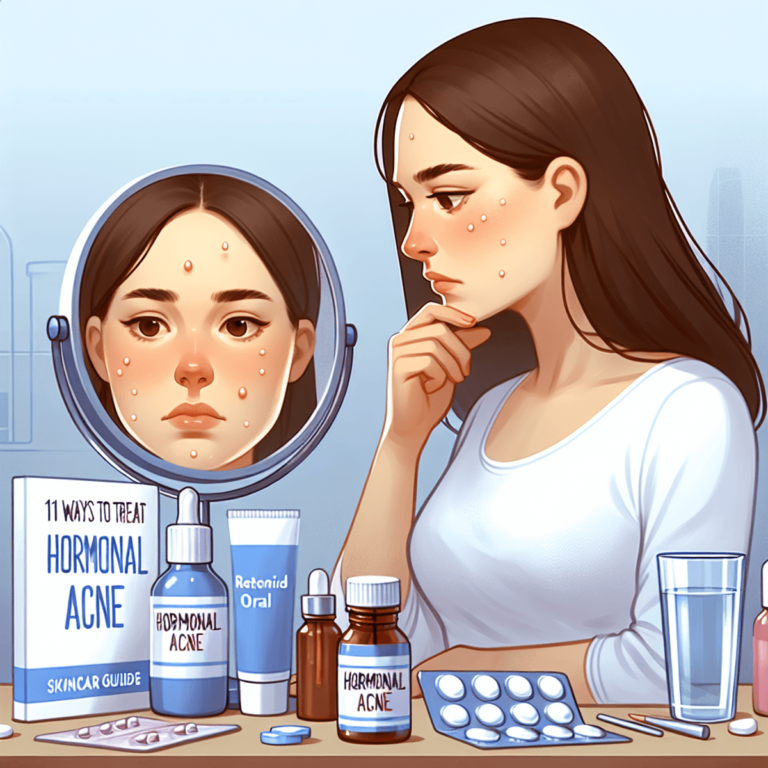Everything you need to know about isotretinoin

Introduction
Isotretinoin is a powerful oral medication primarily prescribed for severe acne that has not responded to other treatments. As a retinoid and vitamin A derivative, it effectively reduces acne lesions by targeting the sebaceous glands, leading to decreased oil production. Understanding isotretinoin is crucial for safe and informed use, given its potential side effects and strict prescribing guidelines.
This article will cover the following topics:
- Definition: An overview of isotretinoin and its classification as an effective treatment for severe acne.
- Indications: Insights into when isotretinoin should be considered over other acne treatments.
- Safety Measures: Information on the iPLEDGE program designed to prevent fetal exposure during treatment.
- Side Effects: A comprehensive list of common and serious side effects associated with isotretinoin therapy.
- Monitoring: The importance of regular follow-ups to manage side effects effectively.
This guide aims to equip you with essential knowledge about isotretinoin, empowering you to make informed decisions regarding your acne treatment journey.
What is Isotretinoin?
Isotretinoin is classified as a retinoid, which is a category of medications derived from vitamin A. This powerful oral medication has become a cornerstone in the treatment of severe acne, particularly in cases that have not responded to other therapies.
How Does Isotretinoin Work?
Isotretinoin works at the cellular level by:
- Reducing Sebaceous Gland Activity: It significantly decreases the size and activity of sebaceous glands, leading to reduced oil production. This is crucial since excess oil can clog pores and contribute to acne formation.
- Preventing Clogged Pores: By promoting skin cell turnover, isotretinoin helps prevent the clogging of hair follicles where acne can develop.
- Anti-inflammatory Effects: The medication also possesses anti-inflammatory properties, which can help reduce redness and swelling associated with severe acne lesions.
How Does Isotretinoin Compare to Other Acne Treatments?
When comparing isotretinoin with other common acne treatments, several distinctions arise:
- Topical Retinoids: While topical options like tretinoin work similarly to isotretinoin, they are generally less potent and often used for mild to moderate acne. They primarily target surface-level issues rather than the deeper causes of severe acne.
- Antibiotics: Oral antibiotics can help combat the bacteria linked to acne but may take longer to show results and do not address oil production or skin cell turnover directly.
- Hormonal Treatments: These options may be effective for women with hormone-related acne but typically do not provide the comprehensive results that isotretinoin offers.
Isotretinoin’s unique mechanism makes it particularly effective for those suffering from severe nodular acne. Its ability to address multiple factors contributing to acne sets it apart from conventional treatments.
Indications for Use
Isotretinoin is primarily used to treat severe acne, especially nodular acne that hasn’t responded to other treatments. This type of acne is characterized by large, painful cysts that can cause significant scarring and emotional distress. Isotretinoin offers a powerful solution by targeting the underlying causes of acne, such as:
- Shrinking sebaceous glands
- Reducing oil production
- Preventing clogged pores
Other Uses of Isotretinoin
Besides its main use, isotretinoin has several non-FDA-approved uses backed by clinical evidence. These include treatment for certain skin cancers, like cutaneous T-cell lymphomas. While these uses may not be officially recognized, they show isotretinoin’s versatility in dermatology.
When to Consider Isotretinoin
When looking at treatment options for severe acne, isotretinoin should be considered alongside other available therapies. You might think about isotretinoin if:
- Other oral medications (like antibiotics) haven’t worked
- Topical treatments have been ineffective
- Acne is causing psychological distress or physical scarring
The decision to prescribe isotretinoin often involves weighing its potential benefits against possible side effects. Consulting with a healthcare provider will ensure an informed choice tailored to your specific condition and treatment history.
Brand Names and Forms of Isotretinoin
Isotretinoin is available under various brand names, each offering different formulations. The most recognized include:
- Accutane
- Claravis
- Absorica
Formulations
Isotretinoin is primarily dispensed in two forms: capsules and tablets.
- Capsules are typically taken with food to enhance absorption.
- Tablets, on the other hand, may have different dissolution properties impacting how the medication is absorbed by the body.
Key Differences Among Brands
While all brands contain isotretinoin, there are notable differences:
Absorption Rates
- Absorica is formulated to allow for greater absorption regardless of food intake.
- Other brands may require patients to adhere to strict dietary guidelines for optimal effectiveness.
Side Effect Profiles
- Individual responses can vary. Some users report different side effects based on the brand used.
- Claravis, for instance, has been associated with more gastrointestinal discomfort compared to other formulations.
Cost Considerations
Cost can be a significant factor when choosing a brand:
- Prices can vary widely between brands, impacting out-of-pocket expenses.
- Insurance coverage for isotretinoin may differ based on the specific formulation prescribed. Some plans may cover one brand over another, influencing patient choice.
Understanding these factors helps in making informed decisions about isotretinoin treatment while considering individual needs and financial circumstances.
The iPLEDGE Program: Ensuring Safety During Treatment
The iPLEDGE program is a critical component in the safe administration of isotretinoin, primarily aimed at preventing fetal exposure risk. Given isotretinoin’s potential to cause severe birth defects if taken during pregnancy, this program enforces strict guidelines for both male and female patients.
Key Elements of the iPLEDGE Program:
- Enrollment Requirement: All patients prescribed isotretinoin must enroll in the iPLEDGE program. This registration ensures that both patients and healthcare providers understand the associated risks.
- Pregnancy Tests:
- For Women of Childbearing Age: A negative pregnancy test is mandatory before starting treatment. Tests must be performed within a specified timeframe (usually one month) prior to initiation.
- Monthly Testing: Women must undergo monthly pregnancy tests during treatment, ensuring ongoing monitoring for any potential pregnancies.
- Contraceptive Measures:
- Two Forms of Contraception: Female patients are required to use two effective forms of contraception simultaneously for at least one month before, during, and for one month after completing isotretinoin therapy.
- Patient Education: Patients receive information on contraceptive options and the importance of adhering to these requirements to mitigate fetal exposure risk.
- Male Patient Requirements:
- While males do not face pregnancy testing requirements, they are educated on potential risks and urged to avoid fathering a child while on isotretinoin.
The iPLEDGE program emphasizes shared responsibility between healthcare providers and patients. By fostering awareness around pregnancy prevention and rigorous monitoring, it plays an essential role in safeguarding against the serious implications of fetal exposure during isotretinoin treatment. Adhering to these guidelines enhances patient safety and promotes informed decision-making throughout the treatment process.
Side Effects of Isotretinoin: What to Expect During Treatment
Isotretinoin is a powerful medication that can lead to various side effects. Understanding these effects is crucial for managing your treatment effectively.
Common Side Effects
Patients often report several common side effects during isotretinoin therapy:
- Dry Skin: A frequent complaint, dryness can affect any part of the body.
- Management Tip: Use fragrance-free moisturizers and lip balms regularly to alleviate discomfort.
- Chapped Lips: This side effect is almost universal among users.
- Management Tip: Keeping a hydrating lip balm on hand can help prevent cracking and soreness.
- Dry Eyes or Mouth: Many patients experience discomfort in their eyes or mouth due to reduced moisture production.
- Management Tip: Consider using artificial tears for dry eyes and staying hydrated throughout the day.
- Nosebleeds: Increased dryness in nasal passages can lead to frequent nosebleeds.
- Management Tip: Saline nasal sprays can keep the nasal lining moist and reduce this risk.
- Increased Sensitivity to Sunlight: Skin may become more susceptible to sunburn.
- Management Tip: Always apply broad-spectrum sunscreen with at least SPF 30 before sun exposure.
Temporary worsening of acne may occur in the initial weeks, but most patients see significant improvement as treatment progresses.
Serious Side Effects: Understanding the Risks Involved
While many side effects are manageable, it’s essential to be aware of serious but rare complications associated with isotretinoin use:
- Depression and Mood Changes: Some patients report experiencing mood swings or depressive symptoms.
- Close monitoring is critical. Regular assessments of mental health are necessary, especially in patients with a history of mood disorders.
- Inflammatory Bowel Disease (IBD): There have been reports linking isotretinoin to IBD, though this association is not fully understood.
- Symptoms may include severe abdominal pain, diarrhea, or rectal bleeding. Immediate medical attention is warranted if these symptoms arise.
- Liver Function Abnormalities: Monitoring liver enzymes through blood tests helps ensure that liver function remains within normal limits during treatment.
Regular follow-up appointments are essential for assessing any emerging side effects and adjusting dosages as needed. Your healthcare provider will guide you on what symptoms warrant immediate attention. Being proactive about these potential risks ensures safer management while benefiting from isotretinoin’s acne-fighting properties.
Monitoring During Isotretinoin Therapy: Ensuring Safety and Efficacy
Regular follow-up appointments are crucial during isotretinoin therapy. These visits provide opportunities to assess treatment response and manage any side effects that may arise.
Key Aspects of Monitoring:
- Assessment of Treatment Response: Healthcare providers evaluate the effectiveness of the medication by checking for improvements in acne severity. Adjustments to the treatment plan may be necessary based on individual progress.
- Dosage Adjustments: Depending on how well you respond to the medication, your doctor might recommend dosage adjustments. This ensures optimal results while minimizing side effects.
- Management of Side Effects: Regular check-ins allow for early identification and management of common side effects, such as dry skin or mood changes. Documenting these experiences helps healthcare professionals tailor their approach to your needs.
- Blood Tests: Routine blood tests monitor liver function and lipid levels. Abnormalities in these areas could indicate complications that require immediate attention.
- Patient Education: Follow-up appointments also serve as an opportunity for patient education regarding potential risks associated with isotretinoin, ensuring informed decision-making throughout the treatment process.
Mental Health Considerations: The Link Between Isotretinoin and Mood Changes
Isotretinoin has been associated with mood changes in some patients, making mental health considerations crucial during treatment. Healthcare providers often utilize depression screening tools to evaluate a patient’s mental health history before prescribing isotretinoin. This proactive approach helps identify individuals who may be at higher risk for mood disorders.
Key aspects of mental health evaluation include:
- Patient History: A thorough review of any previous episodes of depression or suicidal ideation.
- Screening Tools: Standardized questionnaires like the PHQ-9 (Patient Health Questionnaire) can help quantify depressive symptoms and guide clinical decisions.
- Ongoing Monitoring: Regular follow-ups to assess mood changes throughout treatment are essential. Patients are encouraged to report any emerging symptoms promptly.
Understanding the potential impact of isotretinoin on mental health not only enhances patient safety but also fosters open communication between patients and healthcare providers. This dialogue is vital for ensuring comprehensive care while managing severe acne effectively.
Treatment Duration and Expectations with Isotretinoin Therapy
The typical treatment duration for isotretinoin ranges from four to five months. This timeframe is generally sufficient for most patients to see significant improvements in their severe acne. However, individual response times can vary based on several factors:
- Severity of Acne: More severe forms of acne may require extended treatment.
- Dosage: Higher dosages can sometimes lead to quicker results but may increase the risk of side effects.
- Patient Compliance: Consistent adherence to the prescribed regimen influences outcomes.
- Individual Metabolism: Some patients metabolize medications differently, affecting efficacy and duration.
Patients should maintain open communication with their healthcare provider throughout the treatment process. Regular follow-ups allow for adjustments in dosage or duration based on the patient’s progress and any side effects experienced.
Expectations during treatment include initial worsening of acne before improvement occurs, which is common as the medication begins to work. Understanding this aspect can help manage expectations and maintain motivation throughout the course of therapy.
While treatment length variability exists, most patients experience significant benefits within a few months when following their prescribed regimen effectively.
Conclusion: Making an Informed Decision About Isotretinoin Treatment for Severe Acne
Understanding isotretinoin is crucial for effectively managing severe acne. This medication stands out due to its unique mechanism of action, which significantly reduces oil production and prevents clogged pores.
Key points to consider include:
- Effectiveness: Isotretinoin offers a high success rate for individuals with treatment-resistant acne.
- Safety measures: The iPLEDGE program underscores the importance of preventing fetal exposure, highlighting the need for responsible usage.
- Side effects: Awareness of potential side effects, both common and serious, allows patients and providers to monitor treatment closely.
An informed approach empowers patients to weigh the benefits against risks while discussing options with healthcare providers. Knowledge of isotretinoin can lead to improved outcomes and greater satisfaction in acne management.










